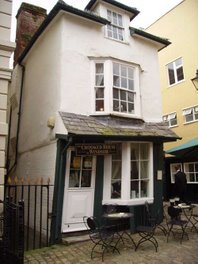A distressing blog this morning from the CEO of Macmillan, Richard Charkin. Not quite sure how to respond to this plea from the heart from a fellow struggling author. What's really depressing is that he appears to have a really good agent. Clearly someone well up in the business believes this man writes great stories. Is this what agents mean when they write back talking about a 'difficult' publishing climate? Guess so. On a brighter note all I can say is that it is impossible to comment without reading the material. The would-be author is more than correct in describing so many hyped novels as next to worthless, his words were: "...truly awful fiction." My main bitch about the big book stores is that they all seem to be offering the same books. All these books might well have been written by a machine; they all revolve around one or two main characters engaged in some hunt to the death. The world of films is often criticised for bringing out sequels. The world of books seems to do nothing but. I'm not saying they're unreadable; indeed some are great fun. But there seems to be a huge gap between the formula book - whether a thriller or a life horror or a something-lit - and the huge range of classic good books. By classic I mean everything from Dostoyevsky to Pullman. As a child I loved reading Agatha Christie. There came a moment one day when I stopped and since then have never read another, although I love the film and tv adaptations. And that last sentence, dear reader, contains a major truth about modern day publishing. Every single Christie book has either been filmed or will be soon. How many of these thrillers and horror lit books makes it to film? Very few. At this point I ought to mention one of the exceptions, Harlan Coben's TELL NO ONE. Knowing how hungry the film business is for stories why is it that so few have been turned into movies? Could it be that when you look more closely, rather than page turn like an obsessive maniac, there is not enough there to hold the cinemagoer's attention for one and a half hours? There is an incredible craziness about linking celebrity with books. I am still waiting to find one person who bought a book by a celebrity because of their looks, their youth, their success in another field of work. Well, well. Of course I am excluding bio and auto bio. Nothing wrong in reading endless bios of The Beatles. Been there, done that, bought the T-shirt. Even bought Lennon's IN HIS OWN WRITE but that was because he was an artist. Ditto Dylan's CHRONICLES. It is so depressing walking into a big bookstore and being faced with a wall of celeb biogs, novels etc. Does any other branch of showbusiness (ouch) operate in this way. The famous author miming rock songs, the famous author treading the fashion catwalk, the famous author standing in as top politician for a month. No, of course it does not. There are exceptions, obviously, when a person is multi-talented. But, in general, the answer is no. So why treat the poor reader abominably? The reader wants a story. Simple as that. Is that too difficult to provide? The real point about the success of the Harry Potter Sevenology is that JK Rowling provided stories. The titles were brave in the extreme and writing about life in a magical public school struck me as weird. But the stories interested readers, not all, but certainly the ones otherwise compelled to read the simplistic stuff popping up on the shelves of the big stores and supermarkets. I have been an obsessive reader since the age of four and I don't ever want to ditch the stories the writers produce for stories about the writer. Once I have read most if not all of a writer's output then I will be interested to learn about that writer's life. Here, though, it is important not to go down the 'Golden Egg' syndrome. If there's anything linking novelists' struggles is surely is that each life, each story, each struggle, is different. I could go on - that's enough on this topic for a while.

